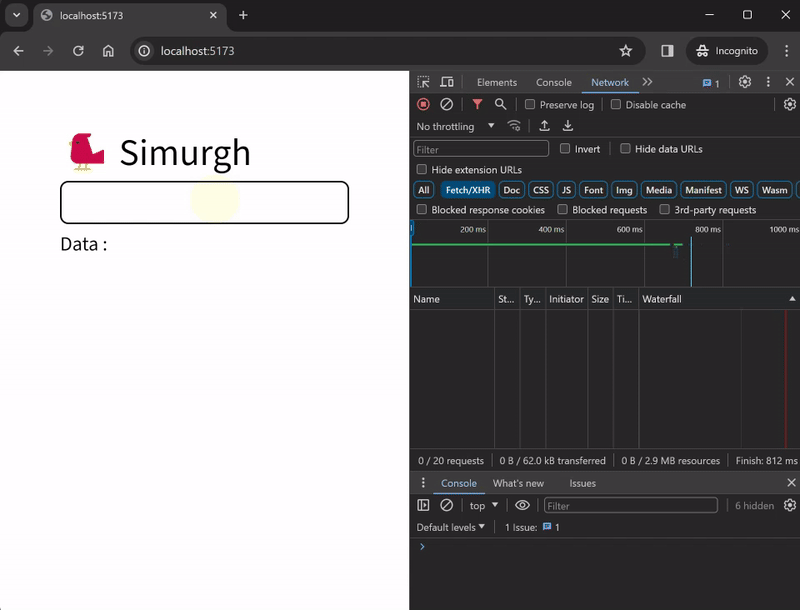
Security News
Package Maintainers Call for Improvements to GitHub’s New npm Security Plan
Maintainers back GitHub’s npm security overhaul but raise concerns about CI/CD workflows, enterprise support, and token management.
qwik-simurgh
Advanced tools
An asynchronous state manager for Qwik - similar to the excellent libraries of Tanstack Query.
useInfiniteQuery()useMutation()pnpm add qwik-simurgh
yarn add qwik-simurgh
npm install qwik-simurgh
SimurghProvider context provider + the store that will hold the cached
queries:// src/routes/layout.tsx
import {component$, Slot} from "@builder.io/qwik";
import type {RequestHandler} from "@builder.io/qwik-city";
import {InMemoryCacheStore, SimurghProvider} from "qwik-simurgh";
export const onGet: RequestHandler = async ({cacheControl}) => {
/* ... */
};
export default component$(() => {
return (
<SimurghProvider store$={() => new InMemoryCacheStore()}>
<Slot/>
</SimurghProvider>
);
});
import {$, component$, useSignal} from "@builder.io/qwik";
import {useQuery} from "qwik-simurgh";
export default component$(() => {
const search = useSignal<string | undefined>("");
const {data, isLoading, isSuccess, isError, errors} = useQuery<string, string, any>({
queryKey: [search],
queryFn$: $(() =>
fetch("https://fakestoreapi.com/products/" + search.value)
.then((res) => res.text())),
select$: $((res: any) => res),
refetchOnWindowFocus: false,
staleTime: 30 * 1000
});
return <div class="m-12 flex flex-col gap-1">
<h1 class="text-3xl">🐦 Simurgh </h1>
<input class="rounded-md border-2 border-blue-400 px-2 py-1 hover:border-blue-700"
value={search.value}
onInput$={(e) => (search.value = e.target?.value)}
/>
{isLoading.value && <div>Loading data...</div>}
{isSuccess.value && <div> Data :{data.value}</div>}
</div>
});

Automatic refetching when search value changes; fetches from cache after the initial request until for the duration of the cache window
worker$()
SHA512 hash of some value on a separate worker threadimport {component$, useSignal} from "@builder.io/qwik";
import {useQuery} from "qwik-simurgh";
import {worker$} from "@builder.io/qwik-worker";
import {computeHash} from "@/hasher"
export default component$(() => {
const text = useSignal<string>(/* ... */)
const {data} = useQuery<string, string, any>({
queryKey: ["hash", text],
queryFn$: worker$(async () => await computeHash(text.value, "SHA512")),
})
return <>{/* ... */}</>
})
server$()
import {component$} from "@builder.io/qwik";
import {server$} from "@builder.io/qwik-city";
import {useQuery} from "qwik-simurgh";
import {db} from "@/db"
export default component$(() => {
const {data} = useQuery<string, string, any>({
queryKey: ["products"],
queryFn$: server$(async () => await db.findAll()),
})
return <>{/* ... */}</>
})
routeLoader$() with useQuery
initialDataimport {$, component$, useSignal} from "@builder.io/qwik";
import {routeLoader$, useLocation} from "@builder.io/qwik-city";
import {useQuery} from "qwik-simurgh";
const useProduct = routeLoader$<Product>(async (req) => {
const product = await fetch("https://fakestoreapid.com/products/" + req.query.get("productId"))
return await product.json() as Product
});
export default component$(() => {
const preloadedProduct = useProduct()
const location = useLocation()
const selectedProductId = useSignal<string>(location.url.searchParams.get("productId"))
const {data} = useQuery<string, string, any>({
queryKey: ["product", selectedProductId],
initialQueryKey: ["product", location.url.searchParams.get("productId")],
initialData: preloadedProduct.value,
queryFn$: $(() => fetch("https://fakestoreapi.com/products/" + location.url.searchParams.get("productId"))
.then(res => res.json())),
})
return <>{/* ... */}</>
})
Make sure to set initialQueryKey to a value that matches queryKey initial
state, useQuery will skip calling the query function altogether & uses the preloaded route data directly.
FAQs
Async State Manager for Qwik similar to Tanstack's React Query
We found that qwik-simurgh demonstrated a not healthy version release cadence and project activity because the last version was released a year ago. It has 1 open source maintainer collaborating on the project.
Did you know?

Socket for GitHub automatically highlights issues in each pull request and monitors the health of all your open source dependencies. Discover the contents of your packages and block harmful activity before you install or update your dependencies.

Security News
Maintainers back GitHub’s npm security overhaul but raise concerns about CI/CD workflows, enterprise support, and token management.

Product
Socket Firewall is a free tool that blocks malicious packages at install time, giving developers proactive protection against rising supply chain attacks.

Research
Socket uncovers malicious Rust crates impersonating fast_log to steal Solana and Ethereum wallet keys from source code.